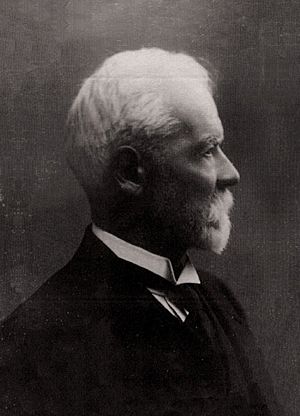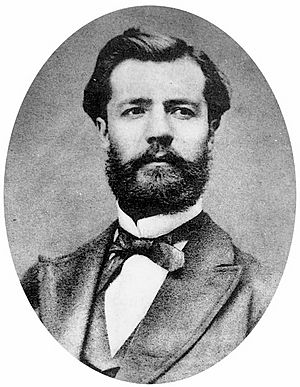Henri Fayol facts for kids
Quick facts for kids
Henri Fayol
|
|
|---|---|

Henri Fayol (at the age of 70)
|
|
| Born |
Jules Henri Fayol
29 July 1841 |
| Died | 19 November 1925 (aged 84) |
| Nationality | French |
| School or tradition |
Taylorism |
| Alma mater | École des Mines de Saint-Étienne |
| Influences | |
| Contributions | Fayolism |
Henri Fayol (born July 29, 1841 – died November 19, 1925) was a French mining engineer and a leader in the mining industry. He created a special way of thinking about how to run a business, which is now called Fayolism. He came up with these ideas around the same time as another famous management expert, Frederick Winslow Taylor. Both are known as founders of modern ways to manage companies.
Contents
Henri Fayol's Life Story
Henri Fayol was born in 1841 in a city now known as Istanbul. His father was an engineer who helped build the Galata Bridge. In 1847, his family moved back to France. Henri later graduated from a mining school in Saint-Étienne in 1860.
Starting His Career
At just 19 years old, Fayol began working at a mining company called "Compagnie de Commentry-Fourchambault-Decazeville". He started as an engineer and was trained to become a manager. The company's leader, Stéphane Mony, saw great potential in Fayol. He became Fayol's mentor. Eventually, Fayol took over from Mony as the manager of the Commentry mine. He later became the managing director of the entire company.
While working at the mine, Fayol studied how to prevent and fight underground fires. He also learned a lot about the structure of the coal basin. In 1888, he became the managing director. During his time as director, he made important changes to improve working conditions. For example, he let employees work in teams and changed how tasks were divided.
Turning a Company Around
By 1900, Fayol was a key member of several important industrial groups in France. The company he worked for was facing serious financial problems and was almost bankrupt. The board chose Henri Fayol to lead the company as the new managing director.
Fayol presented a plan to save the company, and the board agreed. Because of his wide experience in managing, Fayol helped turn the company around. When he retired in 1918, the company was strong and successful. It had become one of the biggest industrial companies in Europe.
After retiring, he continued to share his ideas. He became the Director of the Centre of Administrative Studies in Paris.
Fayol's Ideas on Management
Fayol's ideas became widely known in 1949 when his 1916 book, "Administration industrielle et générale," was translated into English as "General and Industrial Administration." In this book, he shared his theory of management, known as Fayolism. Before this, Fayol had written many articles about mining engineering and some early papers on administration.
Mining Engineering Writings
From the 1870s, Fayol wrote many articles about mining. These included topics like how coal can heat up by itself (1879) and how coal beds are formed (1887). He also wrote about the sedimentation of the Commentry area and plant fossils (1890).
His first articles were published in the French Bulletin de la Société de l'Industrie minérale. Later, his work also appeared in the Comptes rendus de l'Académie des sciences, which are the official reports of the French Academy of Sciences.
What is Fayolism?
Fayol's work was one of the first complete explanations of a general theory for how to manage things. He suggested there are six main types of activities in a company. He also identified five main jobs for managers and fourteen important rules for good management.
Six Types of Company Activities
Fayol said that all the things a company does can be put into six groups:
- Technical activities: Making products or providing services.
- Commercial activities: Buying and selling things.
- Financial activities: Managing money and investments.
- Security activities: Protecting people and property.
- Accounting activities: Keeping track of money and records.
- Managerial activities: Planning, organizing, leading, and controlling.
Five Jobs of Management
In his original book, Fayol said managers have five main jobs:
- Planning: Deciding what to do in the future.
- Organizing: Arranging resources and people to get things done.
- Commanding: Giving instructions and leading employees.
- Co-ordinating: Making sure all parts of the company work well together.
- Controlling: Checking if things are going as planned and making changes if needed. This means managers get feedback to make sure goals are met.
Fourteen Principles of Management
Fayol also came up with 14 principles, or rules, for good management:
- Division of Work: Employees should specialize in different tasks. This makes them better and faster at their jobs, which helps the company be more efficient.
- Authority and Responsibility: Managers have the right to give orders (authority). With this right comes the duty to do a good job (responsibility).
- Discipline: Everyone in the company should follow the rules and show respect. This helps the company run smoothly.
- Unity of Command: Each employee should only receive orders from one boss. This avoids confusion.
- Unity of Direction: Groups of activities with the same goal should be led by one manager with one plan. This keeps everyone focused on the same target.
- Subordination of Individual Interest to General Interest: What's best for the company as a whole should always come before what's best for one person or a small group.
- Remuneration: Employees should be paid fairly for their work. The pay should be enough for them to live on, and the company should be able to afford it.
- Centralization and Decentralization: This is about how much power is held at the top versus how much is shared with lower-level employees in decision-making.
- Scalar Chain: This is the chain of command from the top manager down to the lowest employee. Communication should usually follow this chain. However, Fayol suggested a "Gang Plank" to allow faster direct communication between employees at the same level in emergencies.
- Order: Everything and everyone should have a specific place. This means being organized and tidy, like "a place for everything, and everything in its place."
- Equity: All employees should be treated fairly and kindly by managers.
- Stability of Tenure of Personnel: Companies should try to keep their employees for a long time. High employee turnover (people leaving often) is not good for efficiency.
- Initiative: Employees should be encouraged to come up with their own ideas and carry out plans. This makes them work harder.
- Esprit de Corps: Managers should build team spirit and harmony among employees. This creates unity in the company.
Many of Fayol's principles still influence how businesses are managed today.
See also
 In Spanish: Henri Fayol para niños
In Spanish: Henri Fayol para niños
 | Shirley Ann Jackson |
 | Garett Morgan |
 | J. Ernest Wilkins Jr. |
 | Elijah McCoy |


